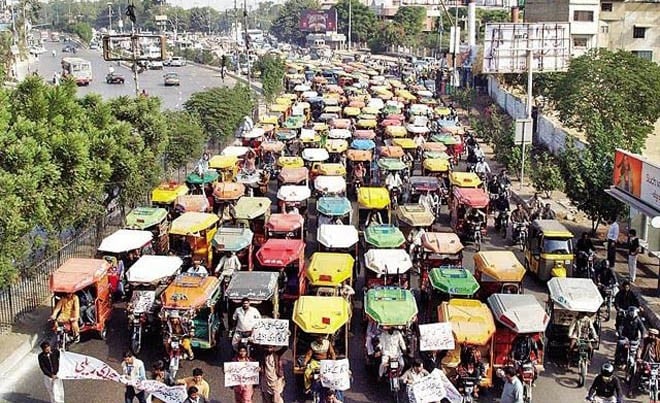
Motorcycle rickshaws have been banned in Karachi under a court order, bringing the city to a virtual halt

The Sindh High Court put a ban on illegal Qingqi rickshaws across the province on August 5. This has affected the people of Karachi the most as the city of 20 million relies heavily on this economical mode of transport for short distance travels since its introduction eight years ago.
The expanding mega city does not have a comprehensive public transport system; the public buses that operate are too short in number to shoulder the load of passengers. To fill the market gap, Qingqi rickshaws jumped into the fray in 2007. By 2012, their numbers swelled to approximately 65,000.
The city’s administration never accepted Qingqi as a public transport option. They never allowed them routes or cleared the vehicle as a viable mode of public mobility. In fact, in the past, the authorities tried to ban the vehicle from the roads, only to reconsider their decision amid protests from unions that were established by 2010.
On August 5, over a petition submitted by a local activist, the Sindh High Court slapped an immediate ban on Qingqi rickshaws rendering millions in Karachi immobile.
As the new session has started after summer holidays, school-going students are perhaps the worst affected of the lot, as Qingqi had become the choice of transport for kids.
"My mother gives me Rs100 daily. I would pay Qingqi Rs20 and spend the rest on snacks," says Kashif Siddiqui, who travels about 10km from his house in Gulistan-e-Jauhar to school. "But now, more than the money, it is the sheer exhaustion that becomes unbearable, as buses are overloaded and it’s difficult to carry a heavy bag while travelling."
Although Qingqi’s presence on Karachi’s roads was a blessing for many, the vehicle is also one of the major factors of traffic jams as with no designated stops, it often acted like rickshaws, halting in the middle of the road for passengers, causing traffic congestion. The vehicle is barred from plying the main arteries of the city like Shahrae-e-Faisal and M.A Jinnah road.
The president of All Karachi Qingqi Owners’ Welfare Association accepts that there are major unresolved issues with Qingqi rickshaws plying the streets of Karachi.
"We accept that there are many issues regarding Qingqi. We are ready to sort them out -- at least recognise us as a stakeholder," says Safdar Ali Khan. "The problem with the administration is that while the people of Karachi accepted us, they did not, which caused this crisis."
Khan says that since it’s the decision of the court he respects that and will take the legal course to have the ban removed. He adds that the issue can only be resolved if the city administration issues them route permits and acknowledges them as one of the mainstream mode of public transport in the city, which, by all estimates, they deserve.
Experts say that the recent hardships faced by commuters is the result of poor governance on the part of city administration which initially allowed Qingqi vehicles to operate unhindered for years. "People have naturally grown used to the vehicle and now suddenly one is pulling the plug on them," says Zahid Qureshi, an independent researcher.
"Karachi needs an efficient public transport system -- a massive project, be it Karachi Circular Railway or something else, which would cater to the needs of the people," he says, "until that is achieved we will see such hue and cry every other day, because efficient transport for a city like Karachi is as important as water and power."
Khan says for the past five years his association is lobbying to win a legal status from Karachi’s administration but nothing transpired. He notes that officials claim that it is not a safe mode of transport.
"We asked them to accept us and provide us with a list of specific requirements they want us to follow, but they never take us seriously."
A Karachi administration official says on condition of anonymity that since the courts have ordered the ban, he wouldn’t like to comment on the issue. He accepted that the people of the city are facing trouble after the ban.
He notes that since the vehicle operates without regulation, the drivers often flout laws with impunity since there are no checks and balances.
Children as young as 12 are seen driving Qingqi. "Since Qingqi does not exist as a vehicle with the excise department, no licensing is required, either for the vehicle or the driver which is fatal for the general public."
He says that the administration should hold talks with them to find a way to sort out the problems and allow them to operate with responsibility.
Despite its various setbacks, the people of Karachi, who rely on public transport for travel, find Qingqi a handy option for short distance travels.